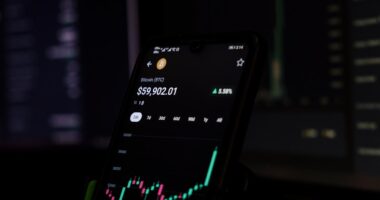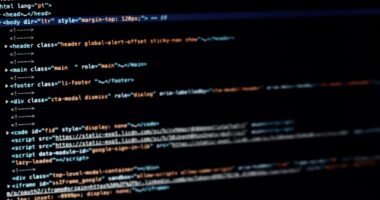Non-fungible tokens (NFTs) are unique digital assets that represent ownership or authenticity of specific digital items, such as artwork, videos, music, or social media content. Unlike fungible cryptocurrencies like Bitcoin or Ethereum, NFTs cannot be exchanged on a one-to-one basis due to their individual uniqueness. NFTs utilize blockchain technology, a decentralized and distributed ledger system that records transactions across a computer network.
This technology ensures each NFT’s uniqueness and prevents replication. When an NFT is purchased, ownership and transaction details are recorded on the blockchain, providing a transparent and unalterable record of ownership. This system allows creators and collectors to trade digital assets with confidence, as the provenance and authenticity of each item can be verified on the blockchain.
NFTs also offer new revenue opportunities for creators. Through smart contracts, self-executing agreements with coded terms, original creators can receive a percentage of the sale price each time their NFT is resold. This feature enables creators to earn ongoing royalties from their work, providing a potential long-term income source in the digital economy.
The advent of NFTs is transforming the way digital assets are bought, sold, and collected. They offer enhanced transparency, clear ownership rights, and new financial opportunities in the digital realm.
Key Takeaways
- NFTs are unique digital assets that represent ownership of a specific item or piece of content on the blockchain.
- When purchasing NFTs, it’s important to choose a reputable platform with a user-friendly interface and strong security measures.
- Safely store and transfer NFTs by using a secure digital wallet that supports the specific blockchain network of the NFT.
- When buying NFTs with Bitcoin, consider the volatility of the cryptocurrency market and be mindful of transaction fees and processing times.
- The NFT industry offers various job opportunities, including roles in digital art, gaming, collectibles, and blockchain technology.
- Career paths in the cryptocurrency and NFT space include roles in blockchain development, cryptocurrency trading, and digital asset management.
- Understand the legal risks and regulations surrounding NFT purchases, including copyright issues, tax implications, and potential scams in the market.
Finding the Right Platform: Where to Purchase NFTs
With the growing popularity of NFTs, there are now numerous platforms where you can purchase and trade these unique digital assets. When choosing a platform to buy NFTs, it’s important to consider factors such as security, user interface, fees, and the variety of available assets. One of the most popular platforms for buying and selling NFTs is OpenSea, which offers a wide range of digital collectibles, artwork, domain names, and virtual worlds.
OpenSea provides a user-friendly interface and supports various cryptocurrencies for purchasing NFTs, making it accessible to a broad audience of collectors and creators. Another leading platform in the NFT space is Rarible, which allows users to create, buy, and sell NFTs without any coding knowledge. Rarible also offers governance tokens that allow holders to participate in platform decisions and earn rewards for their contributions.
For those interested in investing in digital art and collectibles, SuperRare is a curated platform that showcases high-quality artwork from leading digital artists. SuperRare focuses on promoting scarcity and provenance in the digital art world, making it an attractive option for collectors seeking unique and valuable NFTs. In addition to these platforms, there are also niche marketplaces for specific types of NFTs, such as NBA Top Shot for basketball highlights and Sorare for fantasy football trading cards.
As the NFT market continues to evolve, new platforms and marketplaces are likely to emerge, offering even more opportunities for collectors and creators to engage with this exciting new asset class.
Wallet Management: How to Store and Transfer NFTs Safely

Once you’ve purchased an NFT, it’s essential to store and transfer it safely to protect your investment and ensure its security. Unlike traditional assets that can be stored in a physical location such as a bank vault, NFTs are stored in digital wallets that are compatible with the blockchain network where they were created. There are two main types of wallets for storing NFTs: hot wallets and cold wallets.
Hot wallets are connected to the internet and are convenient for frequent trading and transactions, while cold wallets are offline devices that offer enhanced security for long-term storage. When choosing a wallet for your NFTs, it’s important to consider factors such as security features, user interface, and compatibility with the blockchain network where your NFT was created. Popular hot wallet options for storing NFTs include MetaMask, Trust Wallet, and Coinbase Wallet, which support various blockchains and offer user-friendly interfaces for managing digital assets.
For those seeking enhanced security and long-term storage solutions, cold wallets such as Ledger Nano S or Trezor provide offline storage options that protect against hacking and unauthorized access. In addition to storing NFTs securely, it’s also important to understand how to transfer them between wallets or to other users. When transferring an NFT, you’ll need to use the recipient’s wallet address, which is a unique identifier associated with their digital wallet.
It’s crucial to double-check the recipient’s address before initiating a transfer to ensure that you’re sending the NFT to the correct destination. By following best practices for wallet management and transfer protocols, you can safeguard your NFTs and enjoy peace of mind knowing that your digital assets are protected.
Navigating the Crypto Market: Tips for Buying NFTs with Bitcoin (BTC)
As the value of Bitcoin (BTC) continues to rise, many investors are looking for opportunities to diversify their cryptocurrency portfolios by purchasing NFTs with Bitcoin. Buying NFTs with Bitcoin offers a convenient way to leverage your cryptocurrency holdings and invest in unique digital assets that have the potential for long-term value appreciation. When purchasing NFTs with Bitcoin, it’s important to consider factors such as transaction fees, network congestion, and compatibility with the blockchain network where the NFT was created.
One of the most common ways to buy NFTs with Bitcoin is by using a cryptocurrency exchange that supports both Bitcoin and the blockchain network associated with the NFT you want to purchase. By depositing Bitcoin into your exchange account, you can then use it to buy NFTs directly from the platform’s marketplace or by transferring it to a compatible wallet for purchasing NFTs on other platforms. It’s important to be mindful of transaction fees and network congestion when buying NFTs with Bitcoin, as these factors can impact the speed and cost of your transactions.
Another consideration when buying NFTs with Bitcoin is ensuring that the platform or marketplace supports the specific blockchain network where the NFT was created. For example, if you’re interested in purchasing an Ethereum-based NFT with Bitcoin, you’ll need to use a platform that supports both Bitcoin transactions and Ethereum-based NFTs. By doing your research and choosing reputable platforms that offer seamless integration with multiple blockchain networks, you can navigate the crypto market with confidence and expand your investment opportunities in the world of NFTs.
NFT Jobs: Exploring Opportunities in the NFT Industry
The rise of NFTs has created a wealth of new job opportunities in the digital art, entertainment, gaming, and technology sectors. As more creators and collectors enter the NFT space, there is a growing demand for professionals with expertise in areas such as digital marketing, blockchain development, legal counsel, and community management. For those interested in pursuing a career in the NFT industry, there are various roles available that cater to different skill sets and interests.
One of the most prominent job opportunities in the NFT industry is digital art curation and management. Platforms such as SuperRare and KnownOrigin rely on curators to select high-quality digital artwork for their marketplaces and engage with artists to promote their work to collectors. Digital marketers also play a crucial role in promoting NFT collections and engaging with audiences through social media, email marketing, and influencer partnerships.
Additionally, blockchain developers are in high demand for creating new NFT marketplaces, smart contracts, and decentralized applications that support the growing ecosystem of digital assets. Legal professionals specializing in intellectual property rights and blockchain technology also have opportunities in the NFT industry. With the complex legal landscape surrounding copyright ownership and licensing agreements for digital assets, there is a need for lawyers who can navigate these challenges and provide guidance to creators and platforms.
Community managers are also essential for fostering engagement and building relationships with collectors and creators within NFT communities. Overall, the rise of NFTs has opened up diverse career paths for individuals passionate about art, technology, finance, and innovation.
Crypto Jobs: Career Paths in the Cryptocurrency and NFT Space

In addition to job opportunities specific to the NFT industry, there are also numerous career paths available in the broader cryptocurrency space that encompass blockchain technology, finance, trading, development, and marketing. As cryptocurrencies continue to gain mainstream adoption and investment interest, there is a growing demand for professionals with expertise in areas such as cryptocurrency analysis, trading strategies, software development, cybersecurity, and regulatory compliance. Cryptocurrency analysts play a crucial role in researching market trends, evaluating investment opportunities, and providing insights into price movements for various digital assets.
These professionals often work for investment firms, financial institutions, or media outlets that cover cryptocurrency news and analysis. Cryptocurrency traders also have opportunities to work for hedge funds or proprietary trading firms where they can execute trading strategies based on market data and technical analysis. Software developers specializing in blockchain technology have numerous job opportunities in both traditional tech companies and blockchain startups.
These developers work on building decentralized applications (dApps), smart contracts, and infrastructure for blockchain networks that support cryptocurrencies and NFTs. Cybersecurity experts are also in high demand for protecting digital assets from hacking attempts and ensuring the integrity of blockchain networks. Furthermore, professionals with expertise in regulatory compliance play an essential role in ensuring that cryptocurrency exchanges and platforms adhere to legal requirements related to anti-money laundering (AML) laws and know-your-customer (KYC) regulations.
Marketing professionals specializing in cryptocurrency promotion also have opportunities to work for exchanges or blockchain projects where they can develop marketing strategies targeting crypto enthusiasts and investors. Overall, the cryptocurrency space offers diverse career paths for individuals with skills ranging from finance and technology to law and marketing.
Navigating the Legal Landscape: Understanding the Risks and Regulations of NFT Purchases
As with any emerging industry, navigating the legal landscape of NFT purchases requires an understanding of potential risks and regulations related to intellectual property rights, taxation, money laundering laws, and consumer protection. When purchasing an NFT, it’s important to consider factors such as copyright ownership of digital assets, potential tax implications of buying or selling NFTs, compliance with anti-money laundering regulations when using cryptocurrencies for transactions, and consumer rights related to purchasing digital goods. One of the key legal considerations when buying or selling an NFT is understanding copyright ownership and licensing agreements for digital assets.
Creators must ensure that they have the legal rights to sell their work as an NFT and that they are not infringing on any existing copyrights or trademarks. Additionally, buyers should be aware of any licensing terms associated with an NFT purchase that may restrict how they can use or display the digital asset. Another legal aspect to consider when purchasing NFTs is taxation on capital gains from buying or selling digital assets.
Depending on your country of residence, you may be subject to capital gains tax on profits made from selling an NFT at a higher price than what you paid for it. It’s important to consult with a tax professional or accountant who specializes in cryptocurrency taxation to understand your obligations and ensure compliance with tax laws. When using cryptocurrencies such as Bitcoin or Ethereum to purchase NFTs, it’s essential to be aware of anti-money laundering regulations that may apply to cryptocurrency transactions.
Some jurisdictions require cryptocurrency exchanges and platforms to implement know-your-customer (KYC) procedures to verify the identity of users conducting large transactions or withdrawals. By understanding these regulations and complying with KYC requirements when necessary, you can mitigate potential legal risks associated with using cryptocurrencies for purchasing NFTs. Lastly, consumer protection laws may also come into play when purchasing digital goods such as NFTs.
Buyers should be aware of their rights related to refunds or disputes over misrepresented or fraudulent digital assets. Platforms that facilitate NFT transactions should have clear terms of service outlining buyer protections and dispute resolution processes to ensure a fair marketplace for all parties involved. In conclusion, understanding the legal landscape of NFT purchases is essential for both creators and collectors to navigate potential risks and comply with regulations related to intellectual property rights, taxation, anti-money laundering laws, and consumer protection.
By staying informed about these legal considerations and seeking professional advice when necessary, individuals can engage in the exciting world of NFTs with confidence while mitigating potential legal challenges.
FAQs
What is an NFT?
An NFT, or non-fungible token, is a digital asset that represents ownership or proof of authenticity of a unique item or piece of content, such as artwork, music, videos, or collectibles, using blockchain technology.
How do I purchase an NFT?
To purchase an NFT, you will need to use a cryptocurrency wallet and connect it to an NFT marketplace. Once connected, you can browse the available NFTs, place bids, or buy them directly using cryptocurrency.
What cryptocurrency can I use to purchase NFTs?
Most NFT marketplaces accept Ethereum (ETH) as the primary cryptocurrency for purchasing NFTs. Some marketplaces may also accept other cryptocurrencies such as Bitcoin (BTC) or specific platform tokens.
What is a digital wallet and why do I need one to purchase NFTs?
A digital wallet is a software program that allows you to store, send, and receive cryptocurrencies. You need a digital wallet to purchase NFTs because NFT transactions are conducted using cryptocurrencies, and the wallet is used to hold the funds for purchasing NFTs.
Are there any fees associated with purchasing NFTs?
Yes, there are fees associated with purchasing NFTs, including transaction fees for using the blockchain network, gas fees for Ethereum transactions, and platform fees charged by the NFT marketplace.
What should I consider before purchasing an NFT?
Before purchasing an NFT, you should consider the authenticity and ownership rights of the digital asset, the reputation of the creator or seller, the potential for resale value, and the terms and conditions of the NFT marketplace. Additionally, you should be aware of the environmental impact of blockchain technology used for NFTs.





